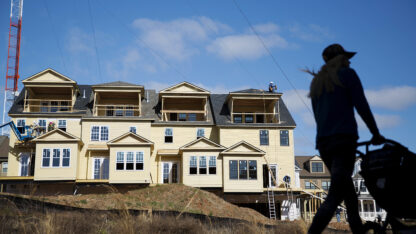With Just 1 Plant Under Construction, Nuclear Renaissance Stalls

©2015 GEORGIA POWER CO.
Earlier this week, utilities in South Carolina decided to stop working on a nuclear power plant expansion, leaving Georgia the only state in the nation with nuclear reactors currently under construction.
The scrapping of the South Carolina plant raises questions as to whether there’s a future for nuclear energy in the United States.
Five years ago, Georgia Power was starting work on some of the first nuclear reactors to be built in the country in three decades. In 2012, then-Energy Secretary Steven Chu stopped by the plant in Waynesboro, touting the reactors as a critical part of President Barack Obama’s energy strategy.
“The resurgence of America’s nuclear industry starts here in Georgia,” he said.
He was at Plant Vogtle, a facility owned by Georgia Power that already had two nuclear reactors. This project would add two more.
A Pause On New Nuclear
American energy companies had scrapped their plans for new nuclear power plants decades earlier, after the partial meltdown at Pennsylvania’s Three Mile Island.
“When Three Mile Island hit in ’79, there were a lot of cancellations. There were projects that were stopped. There were a lot of regulatory changes,” said Paul Murphy, managing director in the energy group at the law firm Gowling WLG. Public opinion changed, too, he said.
There were economic factors even before that, said Edwin Lyman, a physicist with the Union of Concerned Scientists.
“Partly it was due to an increase in construction costs,” he said.
So for the most part, the country’s nuclear power plants that were already up and running kept running. And other countries kept building new reactors.
But U.S. utilities backed off on adding more. (A nuclear reactor that went online in Tennessee last year was initially begun in the 1970s.)
The ‘Renaissance’
By about 10 years ago, Three Mile Island and Chernobyl were far enough back in history that people were ready to talk about nuclear again, Murphy said.
“On top of that, when you look at the mid-2000s, people were projecting significant growth in power demand,” he said.
Nuclear construction is expensive and takes a long time, but once it’s up and running, it’s reliable power. And it doesn’t generate the greenhouse gas emissions that contribute to climate change.
So it seemed like a good idea. Utilities around the country started applying to the federal government for permission to build new nuclear reactors; permission was granted; and Georgia and South Carolina energy companies got to work, building a brand new kind of reactor designed by a company called Westinghouse.
It was going to be a nuclear renaissance.
But right around that same time, the global financial crisis flattened the demand for electricity.
“Then the boom in unconventional natural gas occurred,” said Marilyn Brown, a public policy professor at Georgia Tech and board member of the Tennessee Valley Authority.
Fracking flooded the U.S. energy market with cheap natural gas.
“And that meant if you went back to reappraise the nuclear investments, they probably would not have been approved — or might not have been approved,” Brown said.
‘Last Kid On The Block’
At this point, no other utilities have started building the projects that were supposed to be part of the American nuclear renaissance. It’s just been the expansions at Plant Vogtle in Georgia and the V.C. Summer project in South Carolina.
Both of those projects have run into cost overruns and delayed schedules.
Then, earlier this year, Westinghouse, the company building the nuclear units, went bankrupt. Westinghouse said it was because of the high construction costs at those two plants.
On Monday, the utilities in South Carolina, SCANA and Santee-Cooper, decided to scrap the V.C. Summer nuclear expansion project.
“Now the focus comes on Vogtle because of this action by South Carolina,” said Stan Wise, chairman of the Georgia Public Service Commission, which regulates Georgia Power. “A decade ago, we believed that SCANA and Georgia Power would be the leaders of what would have been a nuclear renaissance. And now Vogtle’s the last kid on the block, and we’ve got to make a decision about go or no go.”
Wise said he’s still a proponent of nuclear energy. And he thinks Georgia Power is in a better financial position than the South Carolina utilities were, with more ratepayers shouldering the costs.
Georgia Tech’s Marilyn Brown said the nuclear renaissance does appear to be stalled right now. But she hopes that Plant Vogtle is completed.
“I’m a person very concerned with climate change,” she said. “If these plants can’t be continued, then where would you build the next one? Is that the demise of the industry?”
Georgia Power now is studying what it will cost to finish the new reactors at Plant Vogtle, and how long it’ll take. The company says that assessment will be finished this month. Meanwhile, it’s continuing construction.
9(MDAxODM0MDY4MDEyMTY4NDA3MzI3YjkzMw004))







